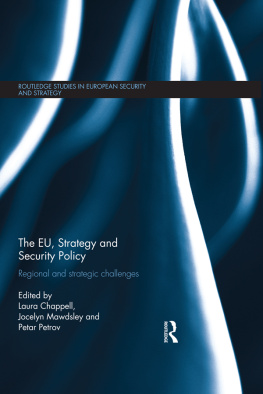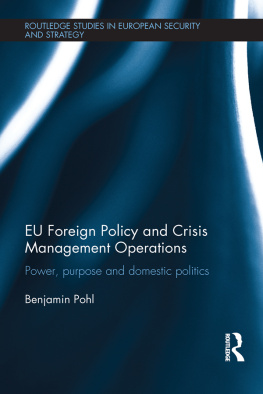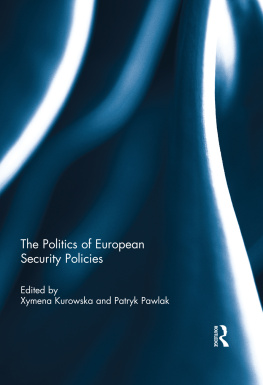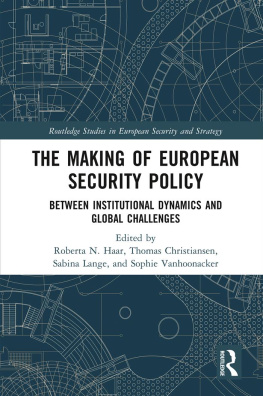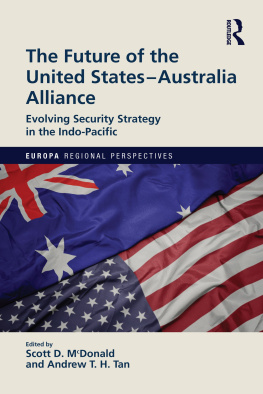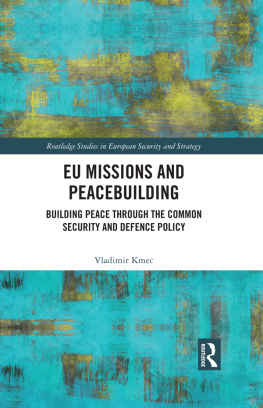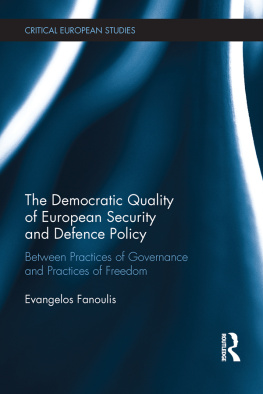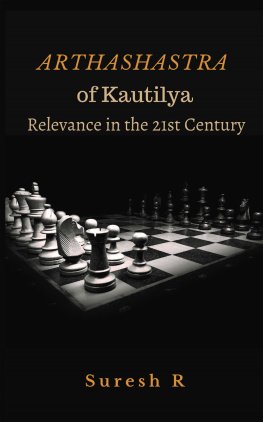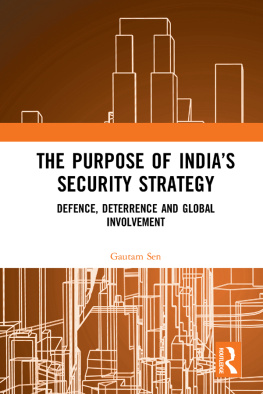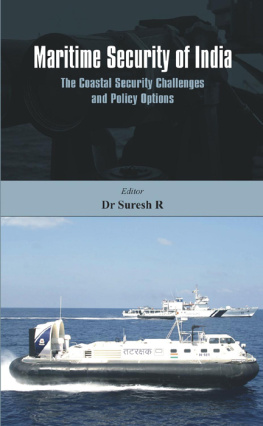First published 2016
by Routledge
2 Park Square, Milton Park, Abingdon, Oxon OX14 4RN
and by Routledge
711 Third Avenue, New York, NY 10017
Routledge is an imprint of the Taylor & Francis Group, an informa business
2016 selection and editorial matter, Laura Chappell, Jocelyn Mawdsley and Petar Petrov; individual chapters, the contributors
The right of the editor to be identified as the author of the editorial matter, and of the authors for their individual chapters, has been asserted in accordance with sections 77 and 78 of the Copyright, Designs and Patents Act 1988.
All rights reserved. No part of this book may be reprinted or reproduced or utilised in any form or by any electronic, mechanical, or other means, now known or hereafter invented, including photocopying and recording, or in any information storage or retrieval system, without permission in writing from the publishers.
Trademark notice: Product or corporate names may be trademarks or registered trademarks, and are used only for identification and explanation without intent to infringe.
British Library Cataloguing-in-Publication Data
A catalogue record for this book is available from the British Library
Library of Congress Cataloging-in-Publication Data
Names: Chappell, Laura, 1980 editor. | Mawdsley, Jocelyn, editor. |
Petrov, Petar, editor.
Title: The EU, strategy and security policy : regional and strategic
challenges / edited by Laura Chappell, Jocelyn Mawdsley and Petar
Petrov.
Other titles: European Union, strategy and security policy
Description: Abingdon, Oxon ; New York, NY : Routledge, 2016. |
Series: Routledge studies in European security and strategy | Includes
bibliographical references and index.
Identifiers: LCCN 2016000878| ISBN 9781138899483 (hardback) |
ISBN 9781315707846 (ebk)
Subjects: LCSH: Common Security and Defence Policy. | Security,
InternationalEuropean Union countries. | National securityEuropean
Union countriesInternational cooperation. | European Union countries
Military policy. | European Union countriesDefenses.
Classification: LCC JZ6009.E85 E86 2016 | DDC 355/.03354dc23
LC record available at https://lccn.loc.gov/2016000878
ISBN: 978-1-138-89948-3 (hbk)
ISBN: 978-1-315-70784-6 (ebk)
Typeset in Times New Roman
by Wearset Ltd, Boldon, Tyne and Wear

Routledge Studies in European Security and Strategy
Series editors: Sven Biscop
Egmont Royal Institute for International Relations, Belgium
and
Richard Whitman
University of Kent, UK
The aim of this series is to bring together the key experts on European security from the academic and policy worlds, and assess the state of play of the EU as an international security actor. The series explores the EU, and its member states, security policy and practices in a changing global and regional context. While the focus is on the politico-military dimension, security is put in the context of the holistic approach advocated by the EU.
Tactical Nuclear Weapons and Euro-Atlantic Security
The future of NATO
Edited by Paolo Foradori
The EU and Military Operations
A comparative analysis
Katarina Engberg
The EU and Effective Multilateralism
Internal and external reform practices
Edited by Edith Drieskens and Louise van Schaik
EU Foreign Policy and Crisis Management Operations
Power, purpose and domestic politics
Benjamin Pohl
EU Foreign Policy, Transitional Justice and Mediation
Principle, policy and practice
Laura Davis
The European Defence Agency
Arming Europe
Edited by Nikolaos Karampekios and Iraklis Oikonomou
EU Security Policy and Crisis Management
A quest for coherence
Nicole Koenig
The EU, Strategy and Security Policy
Regional and strategic challenges
Edited by Laura Chappell, Jocelyn Mawdsley and Petar Petrov
Contents
LAURA CHAPPELL, JOCELYN MAWDSLEY AND PETAR PETROV
ANA E. JUNCOS
RONJA KEMPIN AND RONJA SCHELER
WOLFGANG MHLBERGER AND PATRICK MLLER
RHYS MERRETT
ALISTAIR J.K. SHEPHERD
ANDR BARRINHA AND HELENA CARRAPIO
MICHAEL E. SMITH
JULIA SCHMIDT
SIMON DUKE AND SOPHIE VANHOONACKER
LAURA CHAPPELL, JOCELYN MAWDSLEY AND RICHARD WHITMAN
DAVID J. GALBREATH AND SIMON J. SMITH
LAURA CHAPPELL, JOCELYN MAWDSLEY AND PETAR PETROV
We would like to thank the University Association for Contemporary European Studies (UACES) for their generous support of the Collaborative Research Network (CRN) on CSDP Strategy and in particular Luke Foster for his kindness and professionalism, which led to this book. We would also like to thank all of the participants within the three workshops for their ideas, support and the stimulating discussions, which arose through these. We are particularly appreciative of our colleagues at the EGMONT Institute and the co-convenor of the CRN, Sven Biscop, for his support, particularly when choosing good restaurants. Thanks are also due to our students of EU external relations at Newcastle, Surrey and Maastricht for their interest and curiosity, which helped us shape some of the themes within this edited collection. Finally, the three editors would like to thank their family and friends from within academia and outside for their support.
7
The EUs emerging security actorness in cyberspace
Andr Barrinha and Helena Carrapio
Introduction
The importance of cybersecurity, in its different facets, has accelerated exponentially, accompanying the digital revolution in industry, households and state infrastructures. From personal computers to smartphones and cloud computing, the range of devices interconnecting individuals has become highly diverse. The number of online users has increased substantially, revealing a dramatic change in the way we develop our professional and personal activities. One-third of European Union (EU) citizens were already using online banking in 2010, 73 per cent of European households had access to the Internet by 2011, and 60 per cent of citizens were shopping online by 2012 (European Commission 2012a; Eurostat 2013).
Such technological and societal revolution may be openly welcomed and cheered, but it is also understood as carrying the seeds of potential risks (Eriksson and Giacomello 2010). Given Europes advanced degree of digital dependence, specific sectors of activity (namely communications, commercial transactions, and critical infrastructures) are perceived as being in need of protection from possible abuse. In Europe, and particularly within the EU, this cybersecurity awareness has resulted in a push for the production of policy measures aimed at improving resilience, following a deeper understanding of the risks involved in this field. The security of cyberspace has come to be understood as a matter of high political salience. Although absent from the 2003 European Security Strategy , cyberspace was considered an area of potential risk in the 2008 Report on the Implementation of the European Security Strategy (Council of the EU 2008a). Since then, the EU has developed an approach to cybersecurity that includes a broad range of policies and initiatives, which are underpinned by a holistic understanding of security. However, as this chapter will argue, this approach is marked by a strong proclamation- implementation gap (Argomaniz 2012), as there is a significant difference between the way the EU discursively frames itself (and its aims) in relation to cybersecurity and the practices and institutional layout it has at its service.

